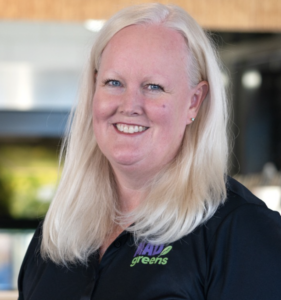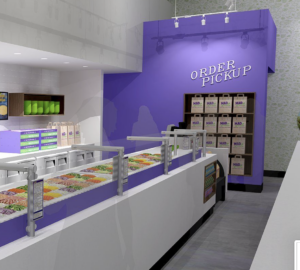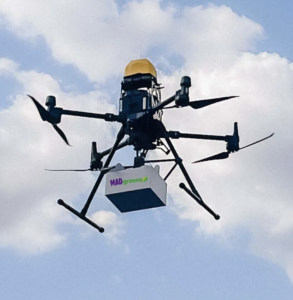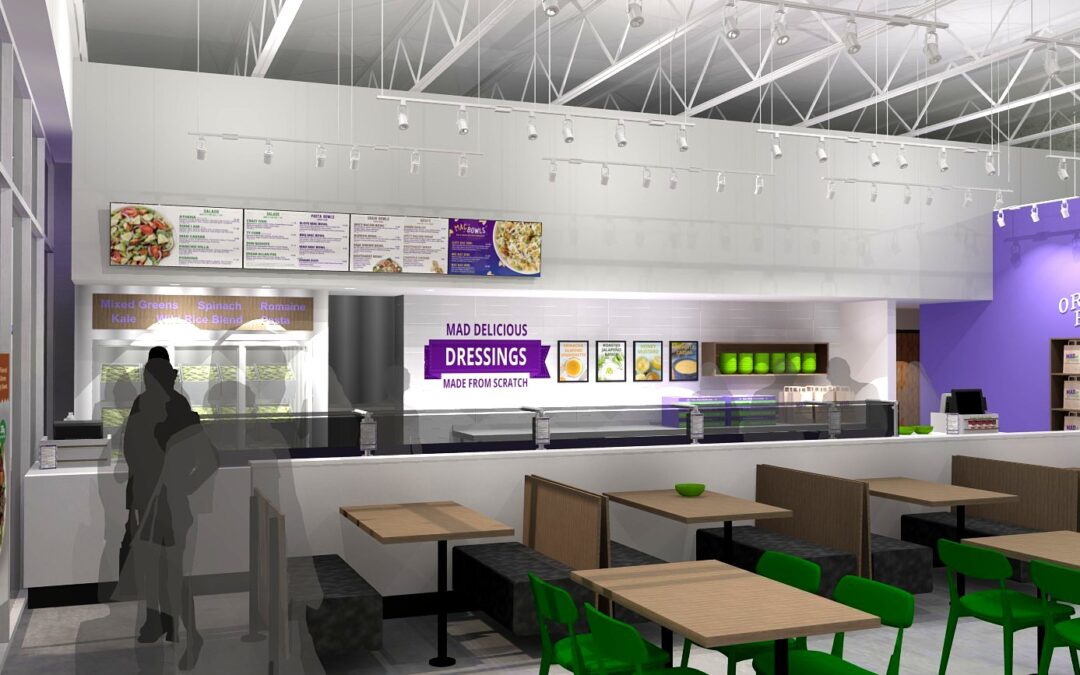Colorado-based Mad Greens is leaning further into supporting its off-premises and catering demands with a new prototype design.
Online ordering has significantly increased over the last few years for the fast-casual health chain, which offers salads, grain bowls and wraps. To date, 50 percent of overall sales come in digitally.
“Dine-in traffic is way down, but overall sales are good with delivery, pickup and to-go,” said Darden Coors, CEO of Salad Collective, the parent company of Mad Greens.

Darden Coors, CEO of Salad Collective.
“About 50 percent of people still come through the door, but only 15 to 20 percent actually dine-in the restaurant,” said Coors—adding that catering makes up a strong part of the business.
To accommodate growing digital verticals, Mad Greens debuted a refreshed restaurant design, with smaller dining rooms and larger kitchens equipped with a second makeline for online orders. The updates enable higher throughput during daypart rushes by taking online orders off the front line.
“So, the in-store guest doesn’t feel ignored or feel like they’re sort of a second fiddle to the digital guest,” said Coors. “I think we struck a good balance.”
The new prototype includes front-of-house shelving, to provide an easier pickup for delivery drivers and guests that doesn’t interfere with the flow of those dining-in.
Testing sky-high deliveries
As the chain continues to look at streamlining delivery, Darden relayed an interest in emerging last-mile technologies.

Mad Greens’ new prototype features shelving for a more seamless pickup of online orders.
Mad Greens previously tested drone delivery in Arizona through the company Flyby Robotics. Flyby gently lets products down from a hovering drone to customers’ doorsteps.
“It was a fun test,” said Coors. “We weighed all our food to make sure it would all carry and it would deliver within a mile and a half,” she explained.
“I think from an efficiency standpoint, if we can solve with drone delivery, that would help a lot with last-mile delivery to the guest, to ease traffic and the use of cars,” said Coors. “We are super optimistic that this is a future.”
Tokyo Joe’s (another brand under Salad Collective) as well as Nékter Juice Bar also participated in the initial Arizona test by Flyby.
Several restaurant brands have too jumped on testing and implementing drone delivery.
Mendocino Farms, Pagliacci Pizza and Sweetgreen have worked with drone company Zipline. Others include Chili’s and El Pollo Loco teaming with drone supplier Flytrex.
“You don’t have to be a multibillion-dollar corporation or a global military superpower to reap the economic benefits of autonomous drones,” said Jason Lu, founder & CEO of Flyby Robotics in a previous statement. “Our AI-powered autonomous systems allow any merchant to dramatically reduce the cost of delivery to their customers.”
Despite making headway, drone delivery for restaurants is still in the early stages, as the technology faces federal regulations and tech limitations, such as heat retention and delivering in unfavorable weather.

Mad Greens tested drone delivery through Flyby Robotics.
However, drone delivery has seen significant momentum in retail, with giants like Walmart and Amazon continuing to implement sky-high deliveries of various products.
Expanding with franchise opportunities
In addition, Mad Greens aims to build its franchisee program. The brand is targeting key markets in states where it has established a strong presence, including Colorado, Texas and Arizona.
According to a company statement, prospective franchisees should have multi-unit franchise and restaurant experience as well as a passion for “making healthy eating fun and approachable to all.”
Mad Greens launched in 2004 and has grown to 24 company-owned locations and one licensed location inside the Austin, Texas airport.


